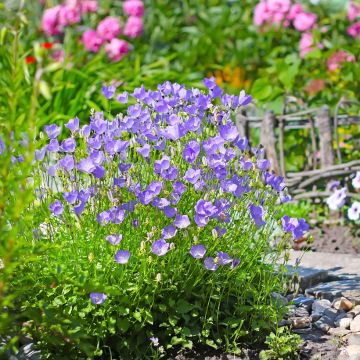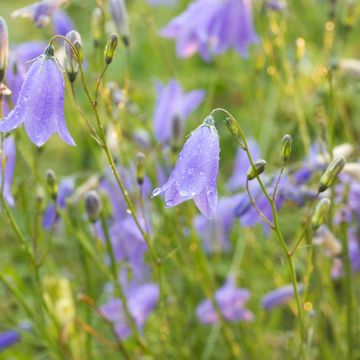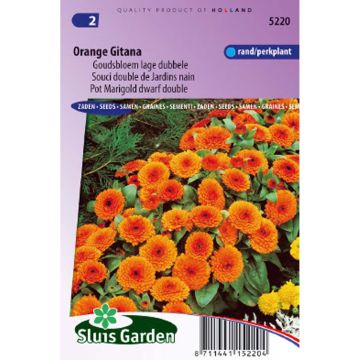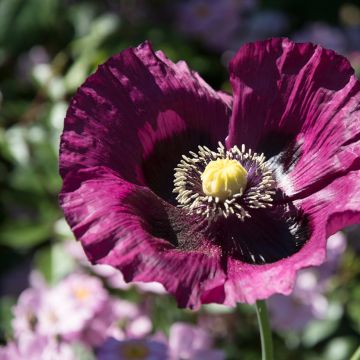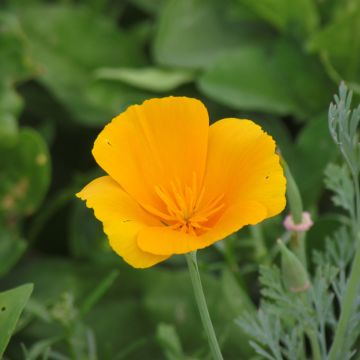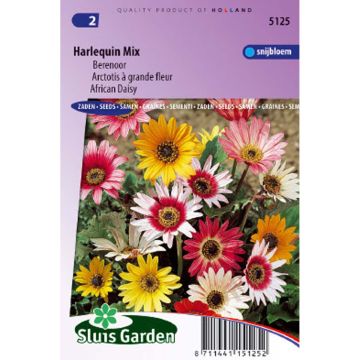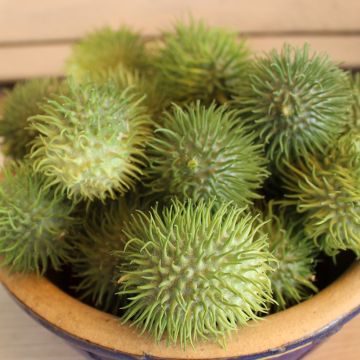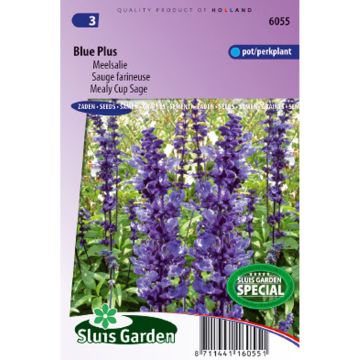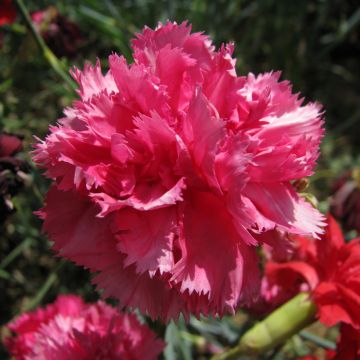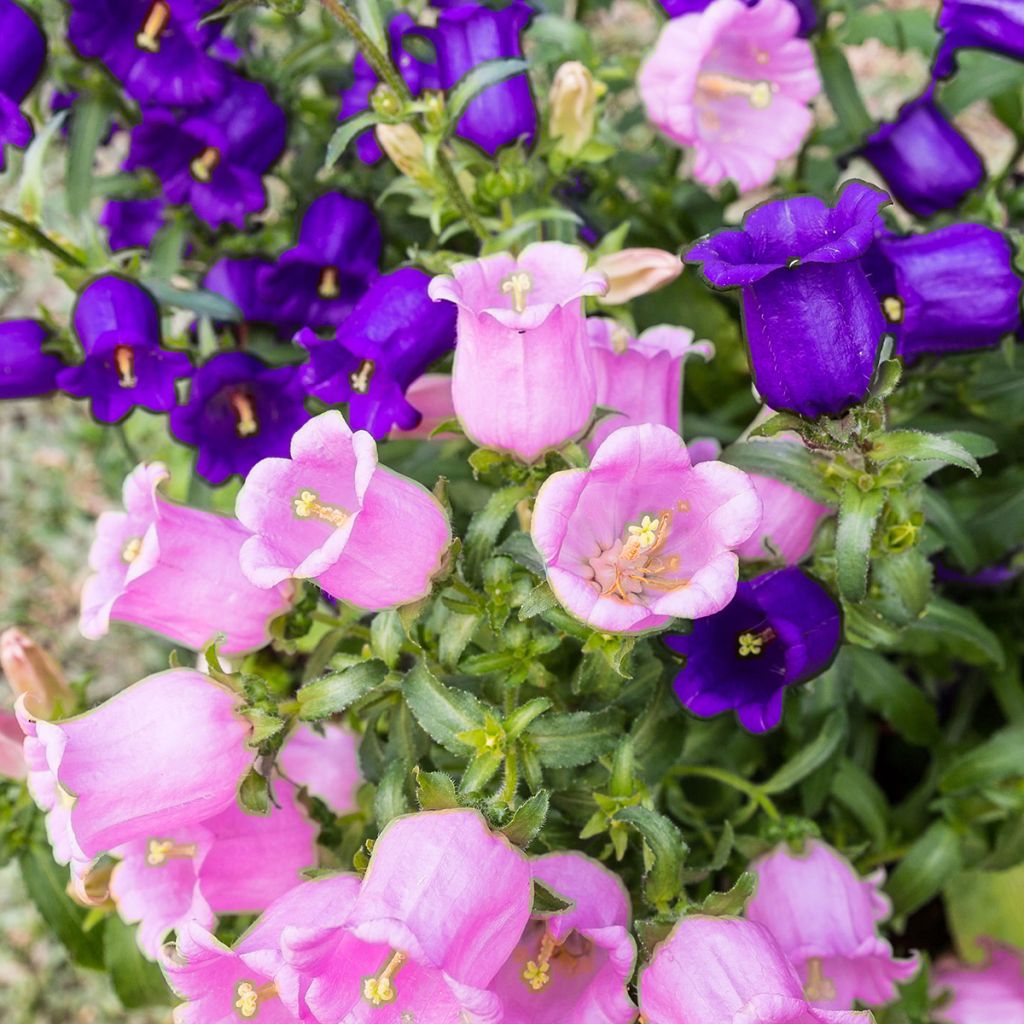

Campanula medium Double-Flowered - Canterbury Bells Seeds
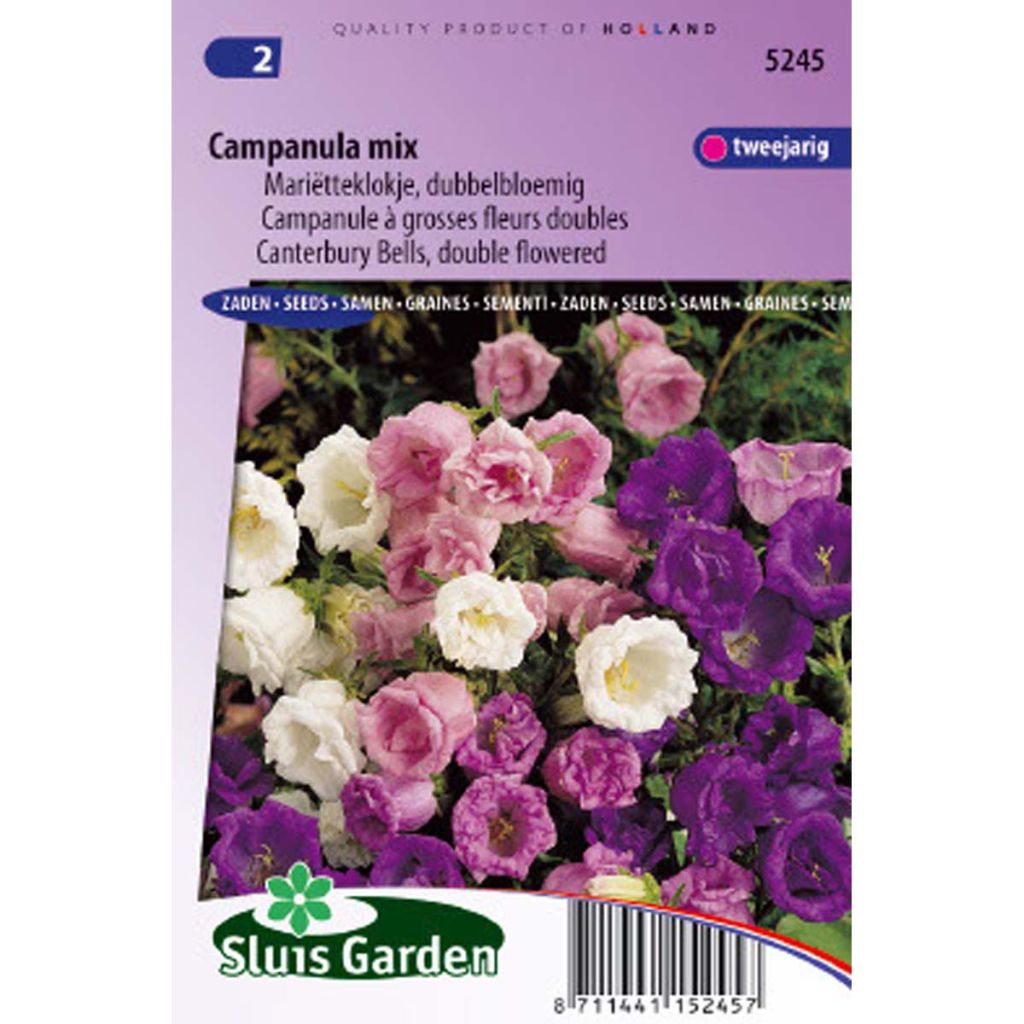

Campanula medium Double-Flowered - Canterbury Bells Seeds
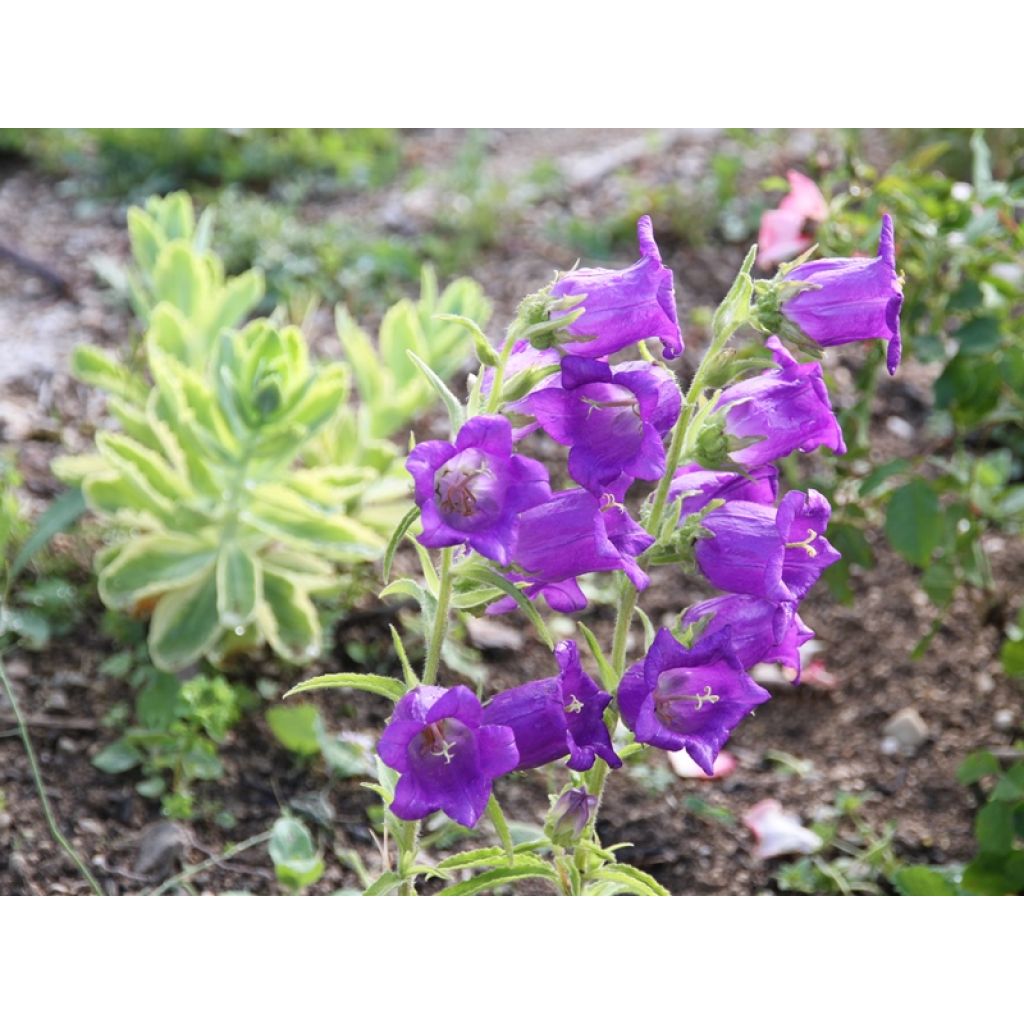

Campanula medium Double-Flowered - Canterbury Bells Seeds
Campanula medium Double-Flowered - Canterbury Bells Seeds
Campanula medium
Bellflower, Calycanthema
This item cannot be shipped to the selected country
Dispatch by letter from €3.90
More information
Schedule delivery date,
and select date in basket
This plant carries a 6 months recovery warranty
More information
We guarantee the quality of our plants for a full growing cycle, and will replace at our expense any plant that fails to recover under normal climatic and planting conditions.
Seed-only orders are dispatched by sealed envelope. The delivery charge for seed-only orders is €3.90.
Does this plant fit my garden?
Set up your Plantfit profile →
Description
Campanula medium or Canterbury Bells are a real cottage garden favourite. This sturdy, floriferous biennial is rather slow growing, but is well worth the wait! In spring and early summer, it displays large double bell-shaped blooms on erect stems in harmonious shades of white, pink, blue or purple. Grown en masse, it creates very romantic drifts of colour and is beautiful in flower arrangements. Grow in the sun or half-shade, in rich, cool, well-drained soil.
Campanula medium is a herbaceous plant of the Campanulaceae family, native to southern Europe. This seed mix brings together several double-flowered cultivars in various shades. In the first year, the plants form basal rosettes of lanceolate green leaves. The following year, from spring to early summer, strong 80 cm tall stems emerge, bearing large bell-shaped flowers (3 to 6 cm long). Colours range from white to pink, blue and purple. They are enclosed in large, prominent green chalices. Pollinated flowers give way to capsules, filled with small seeds that self-seed easily in the right conditions.
Canterbury Bells are without a doubt one of the prettiest bellflowers. They look marvellous in flower beds, borders, or dappled woodland scenes and adapt very well to seaside gardens. For a romantic effect, try combining them with late blooming tulips, peonies and old-fashioned roses. They can also be grown in large pots or containers and overwintered in the greenhouse.
Report an error about the product description
Flowering
Foliage
Plant habit
Botanical data
Campanula
medium
Campanulaceae
Bellflower, Calycanthema
Cultivar or hybrid
Other Campanula (Bellflower) seeds
Planting and care
Sow in late spring/early summer in well-prepared, rich, deep, loose soil. Sow in furrows, 6 mm deep, 15 cm apart. As soon as the seedlings are big enough to be handled (approximately 15 cm tall), transplant them to their definitive position. If possible, choose a shady spot. Add a good shovelful of compost in each planting hole. Space your plants 40 cm apart. Flowering will take place during the second year.
Remove spent flowers regularly for tidier plants and to encourage fresh blooms.
Sowing period
Intended location
-
, onOrder confirmed
Reply from on Promesse de fleurs
Flower seeds
Haven't found what you were looking for?
Hardiness is the lowest winter temperature a plant can endure without suffering serious damage or even dying. However, hardiness is affected by location (a sheltered area, such as a patio), protection (winter cover) and soil type (hardiness is improved by well-drained soil).

Photo Sharing Terms & Conditions
In order to encourage gardeners to interact and share their experiences, Promesse de fleurs offers various media enabling content to be uploaded onto its Site - in particular via the ‘Photo sharing’ module.
The User agrees to refrain from:
- Posting any content that is illegal, prejudicial, insulting, racist, inciteful to hatred, revisionist, contrary to public decency, that infringes on privacy or on the privacy rights of third parties, in particular the publicity rights of persons and goods, intellectual property rights, or the right to privacy.
- Submitting content on behalf of a third party;
- Impersonate the identity of a third party and/or publish any personal information about a third party;
In general, the User undertakes to refrain from any unethical behaviour.
All Content (in particular text, comments, files, images, photos, videos, creative works, etc.), which may be subject to property or intellectual property rights, image or other private rights, shall remain the property of the User, subject to the limited rights granted by the terms of the licence granted by Promesse de fleurs as stated below. Users are at liberty to publish or not to publish such Content on the Site, notably via the ‘Photo Sharing’ facility, and accept that this Content shall be made public and freely accessible, notably on the Internet.
Users further acknowledge, undertake to have ,and guarantee that they hold all necessary rights and permissions to publish such material on the Site, in particular with regard to the legislation in force pertaining to any privacy, property, intellectual property, image, or contractual rights, or rights of any other nature. By publishing such Content on the Site, Users acknowledge accepting full liability as publishers of the Content within the meaning of the law, and grant Promesse de fleurs, free of charge, an inclusive, worldwide licence for the said Content for the entire duration of its publication, including all reproduction, representation, up/downloading, displaying, performing, transmission, and storage rights.
Users also grant permission for their name to be linked to the Content and accept that this link may not always be made available.
By engaging in posting material, Users consent to their Content becoming automatically accessible on the Internet, in particular on other sites and/or blogs and/or web pages of the Promesse de fleurs site, including in particular social pages and the Promesse de fleurs catalogue.
Users may secure the removal of entrusted content free of charge by issuing a simple request via our contact form.
The flowering period indicated on our website applies to countries and regions located in USDA zone 8 (France, the United Kingdom, Ireland, the Netherlands, etc.)
It will vary according to where you live:
- In zones 9 to 10 (Italy, Spain, Greece, etc.), flowering will occur about 2 to 4 weeks earlier.
- In zones 6 to 7 (Germany, Poland, Slovenia, and lower mountainous regions), flowering will be delayed by 2 to 3 weeks.
- In zone 5 (Central Europe, Scandinavia), blooming will be delayed by 3 to 5 weeks.
In temperate climates, pruning of spring-flowering shrubs (forsythia, spireas, etc.) should be done just after flowering.
Pruning of summer-flowering shrubs (Indian Lilac, Perovskia, etc.) can be done in winter or spring.
In cold regions as well as with frost-sensitive plants, avoid pruning too early when severe frosts may still occur.
The planting period indicated on our website applies to countries and regions located in USDA zone 8 (France, United Kingdom, Ireland, Netherlands).
It will vary according to where you live:
- In Mediterranean zones (Marseille, Madrid, Milan, etc.), autumn and winter are the best planting periods.
- In continental zones (Strasbourg, Munich, Vienna, etc.), delay planting by 2 to 3 weeks in spring and bring it forward by 2 to 4 weeks in autumn.
- In mountainous regions (the Alps, Pyrenees, Carpathians, etc.), it is best to plant in late spring (May-June) or late summer (August-September).
The harvesting period indicated on our website applies to countries and regions in USDA zone 8 (France, England, Ireland, the Netherlands).
In colder areas (Scandinavia, Poland, Austria...) fruit and vegetable harvests are likely to be delayed by 3-4 weeks.
In warmer areas (Italy, Spain, Greece, etc.), harvesting will probably take place earlier, depending on weather conditions.
The sowing periods indicated on our website apply to countries and regions within USDA Zone 8 (France, UK, Ireland, Netherlands).
In colder areas (Scandinavia, Poland, Austria...), delay any outdoor sowing by 3-4 weeks, or sow under glass.
In warmer climes (Italy, Spain, Greece, etc.), bring outdoor sowing forward by a few weeks.





































